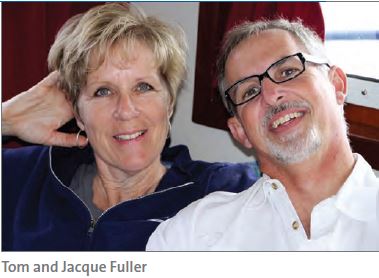
Tom Fuller’s first entrée into the world of genetic testing came when he wanted to learn if, like his father and sister, he had Lynch Syndrome, a gene mutation that increases the risk of developing certain cancers. Tom tested negative, which gave him hope after his successful battle with colon cancer at age 30. He spent 28 years in remission until 2015 when oncologist Dr. Daniel Greenwald informed him the disease had returned. Dr. Greenwald asked Tom to visit Danielle Sharaga, MS, LCGC, a Cancer Center certified genetic counselor. Life-changing is the only way to describe the outcome.
Danielle reviewed Tom’s medical history and doubted the results of his first genetic work-up. Her intuition proved correct and Tom re-tested positive for Lynch syndrome. The science had progressed greatly since his younger days and the unraveling of his predispositions fascinated Tom and his wife, Jacque. “It was amazing to see how it was all plotted out,” she describes. “It’s surprising that more people don’t know about this. ” Often, the information gleaned from the genetic testing can help doctors refine treatment. The Fullers learned that Lynch syndrome patients responded well to Keytruda®, an immunotherapy drug used to fight melanoma; helpful information for Tom who couldn’t tolerate his first two rounds of chemotherapy. By early 2017, the new drug eliminated all the cancer in Tom’s colon. But what the couple wanted more than anything
was to eliminate the chance that their two adult daughters inherited the same gene. Each daughter had a 50% chance of testing positive. “There are so many emotions that go along with that,” explains Jacque. “It’s just so hard to deal with.” When Danielle announced that both young women tested negative, the Fullers were elated. “Everyone in the room was rejoicing with us,” says Jacque. This knowledge saved the Fullers’ daughters from frequent colonoscopies and the worry that cancer would ultimately become part of their futures. “Our motto is, you just keep going,” notes Jacque. “We seize the moments. It’s a choice.” This means dancing to the musical alarms Tom sets on his phone to remind him to take his pain medication, and practicing thankfulness that the right people showed up in their lives at the right time.
Back in fall of 2015, Tom’s doctors estimated he would have 21 months to live, so he and his family made preparations for that sad moment. But as the days crept closer to the end of that window, they guessed he’d outlive that prediction. “We laughed together, smiled and said well, we’re still here,” says Jacque. Not wanting to waste a day, they considered purchasing an RV for future road trips. Jacque credits Tom’s endurance and their strong faith as the reasons why they’ve been able to forge on. “It has made us a lot stronger. We can honestly say we would not change our lives because we have learned and grown because of the trials.”
Thanks to a grant through Richard V. Gunner, trustee of the Dr. Howard R. Bierman and Anthony (Andy) Granatelli Fund, the Genetic Counseling program at Cancer Center of Santa Barbara provides education and assessment of genetic disorders like Lynch syndrome.